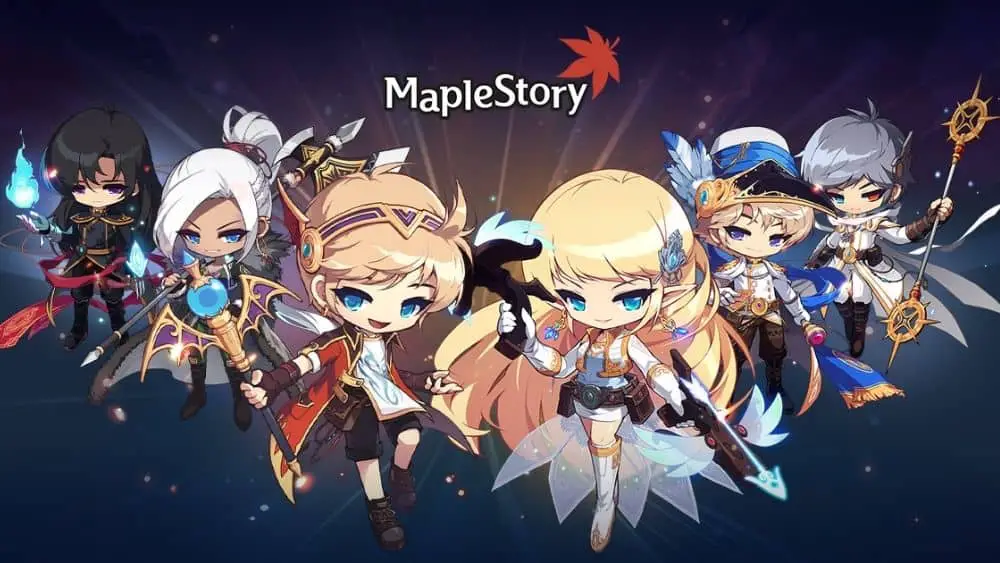Our culture has a strong influence on our preferences in almost every aspect, including tastes in entertainment. Korea, for example, has a particular niche it caters to, specifically free to play 2D MMORPGs; they seem to be all the rage in Korea. Some titles were released in the early 2000s that developers actively support with content updates to this very day.
Games like Maplestory are not unique in Korea, and just because Koreans primarily develop it doesn’t mean that rest of the world hasn’t formed a taste for the genre. The gameplay loop is similar across the titles, grind to collect loot, use said loot to make your character better rinse and repeat.
MapleStory sees the player take the role of a citizen of Maple world. The game doesn’t point you in a specific direction; instead lets you roam free to collect gear and level up, eventually making your character travel to uncharted places.
MapleStory was released slowly all around the globe, starting in Korea in 2003; lately, Thailand also received their own server in 2017. Games like MapleStory require constant updates and fixes to keep the game interesting enough for long time players.
In 2010, 7 years after its launch, Wizet, the game developer, completely revamped the game with a patch aptly named “Big Bang”.
The game today has over 180 million registered users. Players from all across the globe have taken a keen interest in 2D MMORPGs, as the data would suggest. Developers even released a DS title and a mobile spin-off game over the ongoing span of MapleStory’s life.
It even has a sequel; however, it doesn’t keep with the tradition of 2D sidescrolling, instead opting for a more isometric approach. I’d add that it doesn’t seem to have much affected the popularity of the original; in fact, I think it’s meant to attract a different audience altogether.
I’ve covered the 2D MMORPG genre before in my list of games similar to Elsword. So instead, for this list, let’s broaden horizons and look at other games in this niche similar to MapleStory.
1. AdventureQuest
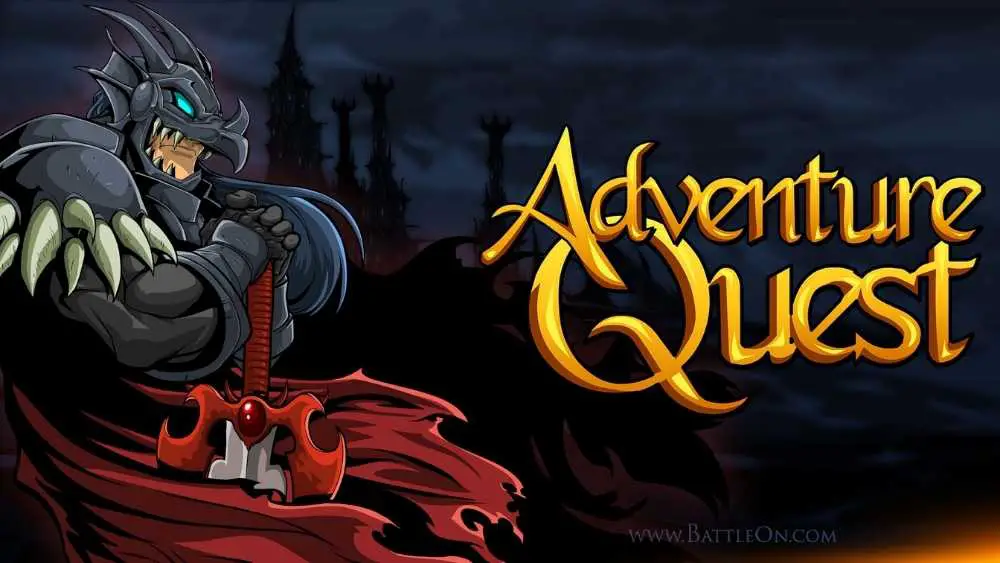
AdventureQuest is a free to play single-player RPG 2D sidescroller released in 2002. The game during its early years was under a lot of scrutinies, with free to play players accusing the developer of putting a cap on how many free players could be on the server and considered it unfair.
Over time, however, the developer has addressed most of these issues, and as it stands, it’s an optimum way to enjoy the game even if you’re free to play player.
It’s a flash-based browser game that plays very much like any other RPG; in fact, they are pretty similar games, minus the PvP and other co-op aspects of MapleStory.
However, AQ features a neat alignment mechanic; the player can choose to be good and evil and choose between 2 factions, Unity and Chaos. This mechanic allows players to don equipment that gives them special effects depending on their alignment and loyalty.
The game also features turn-based combat, which is more or less rock-paper-scissor; each enemy and character (including the player character) has specific resistances and weaknesses to certain elements.
The best way to win is to identify the opponents’ weakness and equip a weapon that is of that element; however, this is easier said than done; players might find they don’t have the particular weapon required or the weapon is too weak to do any real damage despite the added bonus. In situations like these, it’s best to flee.
The game has a spin-off MMORPG title AdventureQuest Worlds released in 2008; however, it doesn’t seem very active.
2. Aeon Rivals
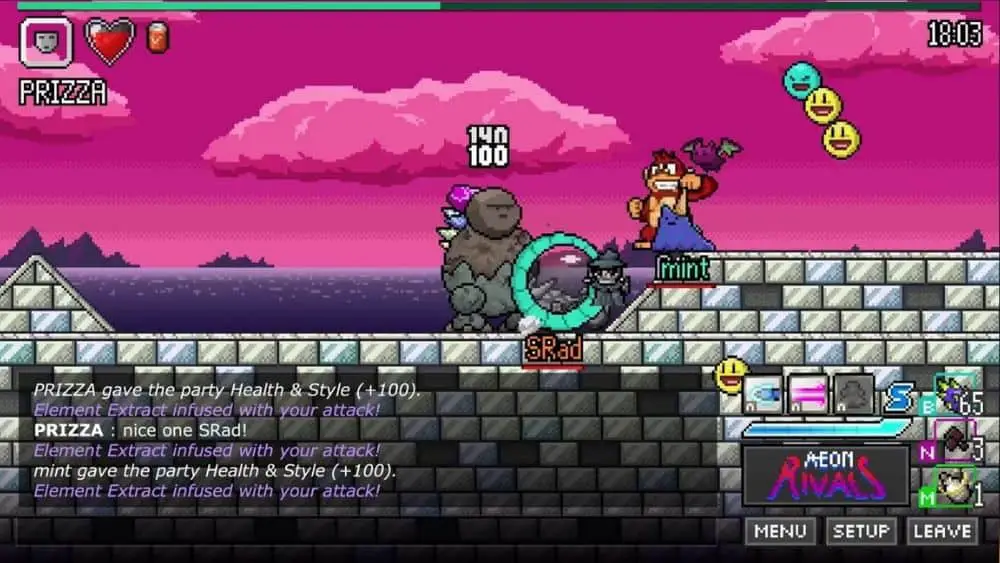
Aeon Rivals is a colourful pixel art style 2D MMORPG that was developed by one person and released about five years ago.
The best part about the game is that the developer is aware of the problems of loot boxes and microtransactions; while the game does feature a shop, it only sells cosmetic items, and the game seems less inclined to be a pay-to-win. Making for a more even playing field only attracts more users; this model makes more sense to me than the endless cash-grabbing schemes of other F2P MMORPGs.
The gameplay is straightforward enough, party up with other players and venture into dungeons to slay monsters. There’s an array of choices presented to players in true RPG fashion; however, it’s in the form of choosing characters who have a pre-determined class and stats along with unique abilities and attacks.
The game follows a subscription-based model like most f2p MMORPGs. It features solid gameplay and enough variation to stay interesting over extended sessions.
3. Awesomenauts
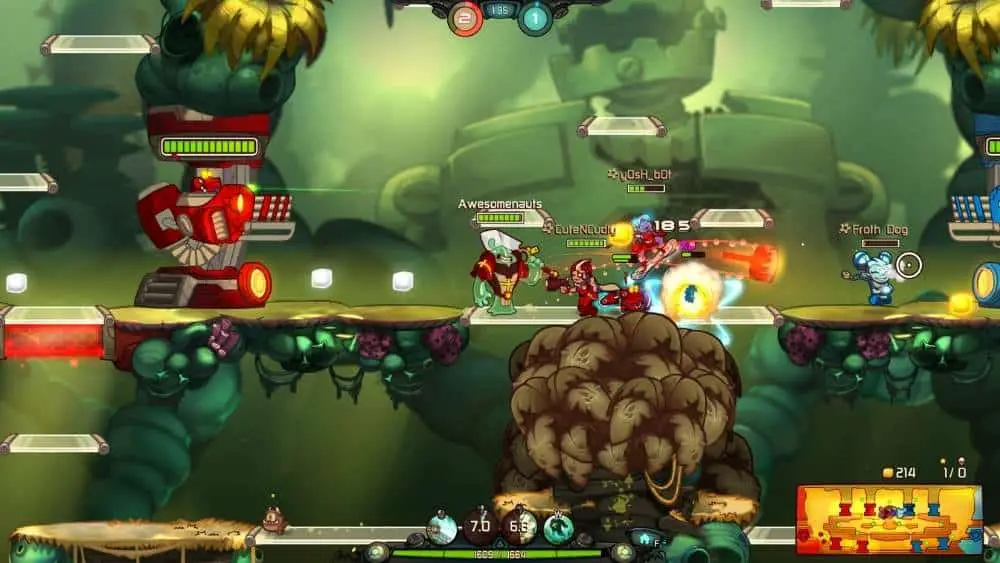
Awesomenauts is a relatively well-known title. Released in 2012 on nearly all platforms, Awesomenauts is a MOBA game developed by Ronimo Games.
The game was praised as an entry-level title to the MOBA genre. For the uninitiated, MOBA stands for Massively Online Battle Arena, a more popular game from the genre would be DOTA or League of Legends.
However, unlike those games, Awesomenauts is a more light-hearted approach to the complex mechanics of traditional MOBAS. Awesomenaut features beautiful graphics combined with platformer elements and a touch of good old 2D arcade fighting games.
At the beginning of a game, players must choose an Awesomenaut to control; each Awesomenaut has a diverse set of stats like HP, strength, etc. They even have a unique personalities conveyed by their appearance and voices.
I’ll be honest I wasn’t expecting voice-overs for a title like this, but this is not a game marketed to a niche; it’s sold for the masses, and so it shows more polish than other games on this list.
Awesomenauts are then put on the battlefield in a 3v3 format, and the goal is to destroy the enemy base, very much like DOTA. There is a ranked system in the game and at the end of each season players are rewarded following their finishing rank.
4. Orake Classic
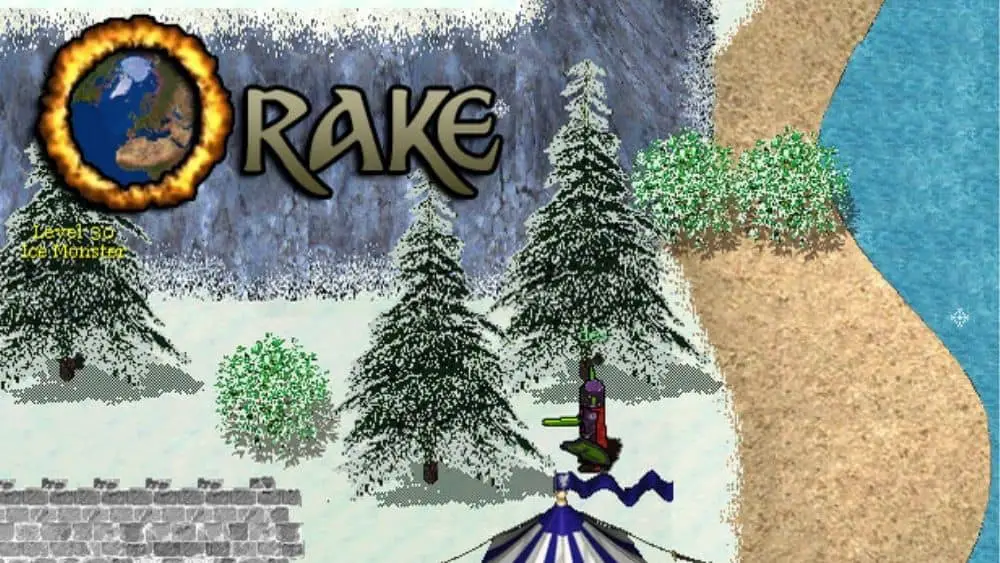
Orake is an example of being famous for all the wrong reasons. It’s a 2D MMORPG with a top-down view and grid-based structure, very reminiscent of Ultima Online, but it’s a very casualized version of it.
The game should’ve been very popular in its niche; it has solid mechanics and great content; it was even re-released in a newer engine quite recently.
However, the player base is at an all-time low, despite all the aspects that should attract old-school veterans of the genre. Still, a vocal part of the community says the developer is power-drunk and doesn’t bother with the balancing aspect of the game.
I won’t speculate how much of this is true; if you’re going to check out this title, I suggest doing due diligence before spending any money.
5. La Tale
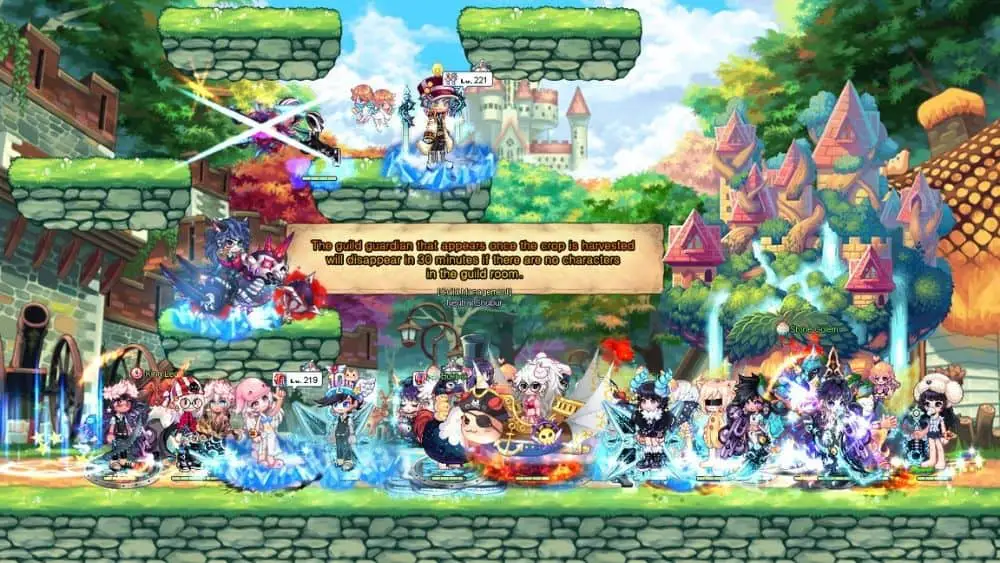
Developed by South Korean Actoz Soft, La Tale was released in 2006. It’s a 2D sidescrolling MMORPG in a fantasy setting. The gameplay loop is what you’d expect by now; it’s a grind to get better stats.
The game features nine classes that affect the character’s base stats without any real money purchase; players can have up to three character slots.
There’s nothing special or noteworthy about this game. It doesn’t stand apart from being one of the few 2D MMORPGs that are still playable.
6. MechQuest
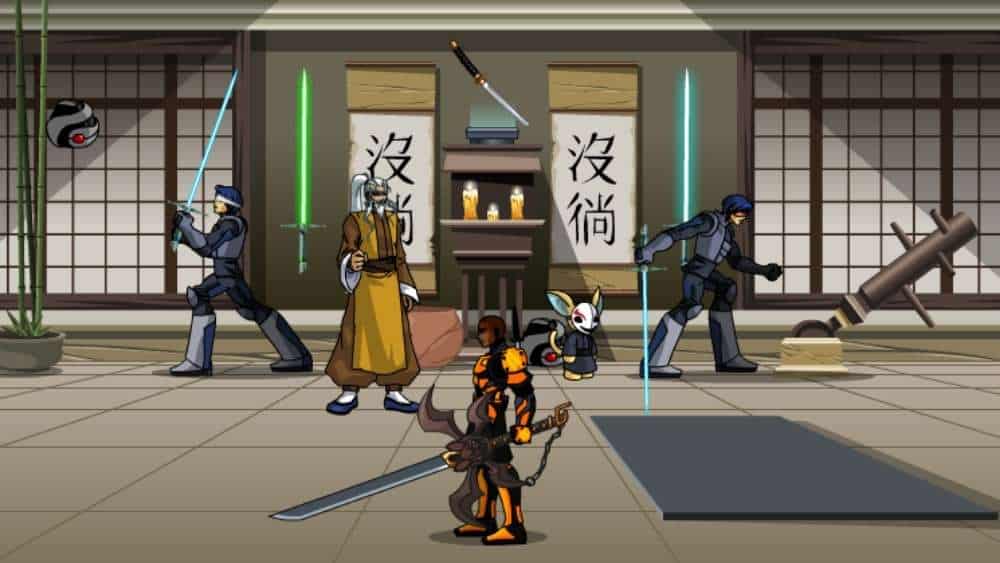
MechQuest is a flash-browser, single-player 2D RPG, released in 2007. However, it’s not a sidescroller; instead, it chooses a more traditional point and click approach.
Players take control of pacific rim-esque mechs that they learn to control in G.E.A.R.S University, which is this game’s tutorial and choosing a house (or class) that will give them access to unique mechs and also enables the player to partake in competitive activities.
There is also an overarching plot of a more significant threat arising that, of course, the player has to put down; it’s all kind of cliche you can expect story-wise.
Like all browser-based RPGs, there’s a free to play model or a one-time payment to allow access to more content (read: better gear).
7. Dragon Fable
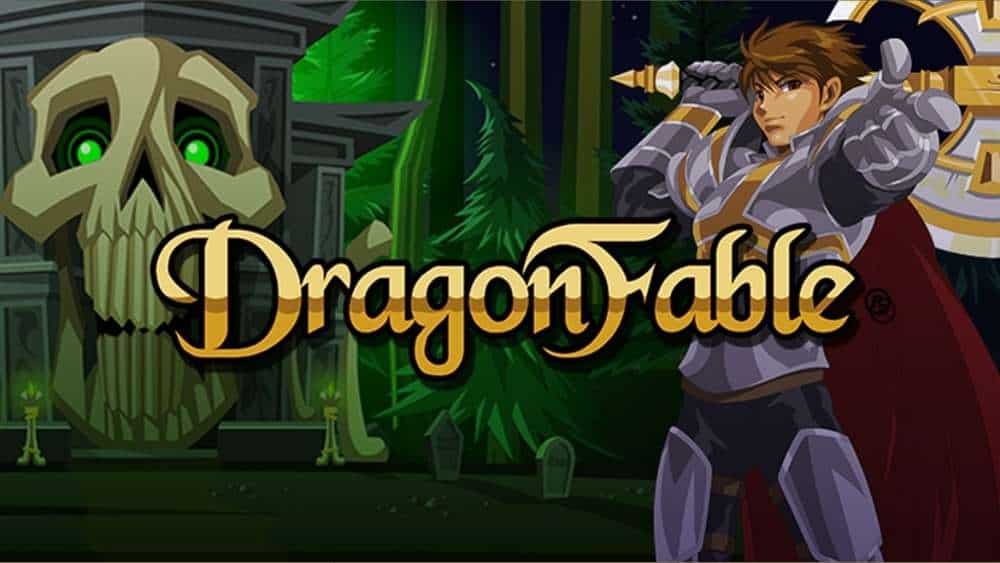
Dragon Fable is another game like MechQuest; it’s a single-player game developed in flash and released in 2006. However, that’s not all they share; they are from the same developer Artix Entertainment.
It’s your typical 2D RPG experience, create a character, assign a class, talk to NPCs, get quests to progress story-wise and let’s not forget getting better gear. The game is a point and click and not a sidescroller. The game has seen content updates weekly since release, and interestingly enough, the content from day one is still available.
Usually, when games get this old, they trim out content for newer players. Dragon Fable instead adopts level scaling the enemy with the player’s allowing for battle on equal footing at all times.
Like MechQuest, it has a passable experience being a 2D browser-based game; it does all that you’d expect and nothing more.
Conclusion
There’s honestly not much growth in this genre anymore; these types of games made sense when gamers had weak hardware and couldn’t run any of the then-latest RPGs or MMORPGs.
It’s interesting to note, though, that despite them feeling dated and not as rewarding as newer games, seasoned players still stick to it, and the genre might have a shot at mobile devices, but with games like CoD and PUBG free on the play store, I have my doubts.
Want to find out similar suggestions for other games as well? Visit our Games Like hub.

